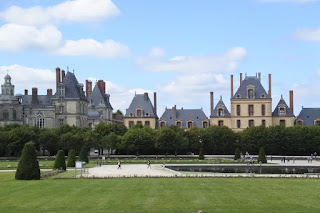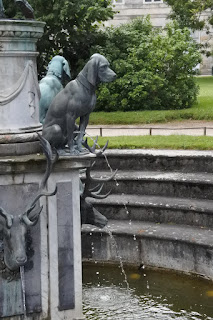Lest our blog become purely baby-related, I wanted to post some stuff about recent travels we have been on. Except... we haven't travelled since the baby arrived. Well, we've made trips around the Paris metropolitan area (which is a pretty big area), but we haven't really been out for more than a few hours or an afternoon or so. Life with babies is complicated!
But, earlier in July, we took a day trip to Fontainebleau, a town about 50km south of Paris. I had been planning to write about our trip, but I never got round to it! Let's do that now.
Fontainebleau is a popular tourist destination for Parisians, mainly due to the nearby
Forêt de Fontainebleau (Fontainebleau forest), but also for the
Château de Fontainebleau, regarded as one of France's most magnificent. The forest is pretty big, 280 square kilometres; that's approximately the same size as Edinburgh, Exmoor national park, or the borough of Queens in New York; it's just under 10% the size of Rhode Island. The forest is popular for hiking, cycling, horse riding, and rock climbing.
It took us maybe an hour to get there by train, and then a 10 minute bus ride from the train station to the town centre. Apparently it's a popular site with Chinese tourists, and there were signs in Chinese at the train station explaining how to use the buses. For us, since the trains and bus system are all in the "Paris region" transport system, we were able to use our monthly transport passes to travel. A day trip for free! Doesn't get much better than that.
 |
| The chateau de Fontainebleau. |
The castle has been successively expanded over the centuries by its different owners, which has lead to a multitude of different architectural styles for the different wings. I'll let you judge whether this has a positive or negative effect on the overall appearance:
 |
| A view of part of the castle from a distance. |
The château is surrounded by extensive gardens, including a lake. You can visit the inside of the castle (apparently the tour is well-regarded), but the weather was so nice we opted to remain outside and stroll the gardens.
 |
| Such tasteful decorations in the castle grounds. (Oui, c'est un chien qui faire un pipi.) |
 |
| Some people relaxing with a picnic by the lakeside. |
 |
| Another view of the castle from one of the tree-lined promenades. |
We didn't venture out into the forest (there was too much to see at the castle, and Talia, being pregnant, only had so much walking energy for the day). Perhaps we will be able to revisit soon and have another exploration, this time with baby in tow!







